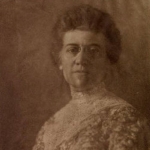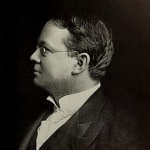Background
George Albert Coe was born into a Methodist parsonage on March 26, 1862, in Mendon, Monroe County, in western New York. He was the son of the Reverend George and Harriet Coe to whom also a daughter, Hattie, was later born.

Rochester, NY, United States
George Coe studied at the University of Rochester. He got a Bachelor of Arts and a Master of Arts.
Boston, MA 02215, United States
George Coe studied at Boston University. He got a Bachelor of Sacred Theology and a Doctor of Philosophy.
Unter den Linden 6, 10117 Berlin, Germany
George Coe studied at the Humboldt University of Berlin.








George Albert Coe was born into a Methodist parsonage on March 26, 1862, in Mendon, Monroe County, in western New York. He was the son of the Reverend George and Harriet Coe to whom also a daughter, Hattie, was later born.
Nurtured in conventional evangelical piety, George Coe entered the University of Rochester at eighteen, where he got a Bachelor of Arts in 1884 and a Master of Arts in 1888. Then, he entered Boston University School of Theology to become a parish minister like his father. However, he turned away from theology and toward philosophy, thereby shifted his career goal from minister to the professor. There Coe earned a Bachelor of Sacred Theology in 1887 and a Doctor of Philosophy in 1891. In 1890 he received a one-year traveling fellowship to the Humboldt University of Berlin, where he was significantly influenced by German psychology.
George Coe was a distinguished scholar in the field of religious education, particularly the psychological interpretation of religion. He authored eleven books and scores of articles in his field.
George Coe taught at the University of Southern California during the period 1888-1890. From 1891 to 1909, he worked at Northwestern University. While serving at Northwestern, Coe held positions as acting professor of moral and intellectual philosophy in 1891-1893, John Evans Professor of Moral and intellectual philosophy in 1893-1909, and honorary professor of philosophy and psychology of religion in 1905-1951. Coe left Northwestern to join the faculty of the Union Theological Seminary in 1909. He remained at Union as a professor of religious education until 1922. Later that year, he occupied the chair of religious education at Teacher's College of Columbia University. Coe retired from teaching in 1927. He published two books while working at Teachers College, Law and Freedom and What Ails Our Youth, both in 1924.
George Coe's participation in a national conference on religious education, while he was at Northwestern, was a watershed experience in his life. That conference was convened in 1903 under the leadership of William Rainey Harper, the president of the University of Chicago, who gathered university and college presidents, nationally prominent clergymen, leaders in the Young Men's Christian Association and Young Women's Christian Association. Also, he invited philosophers, psychologists, and educators from academic institutions across the nation for a three-day conference that culminated in the decision to create the Religious Education Association. Coe served as that organization’s president in 1909-1910. The Religious Education Association represented a movement that summed up for Coe all the influences that had so profoundly shaped his own life. He was to become known as the father of the religious education movement, but he could just as well have been called the son of the movement, for all the influences that gave to the association also birthed his own intellectual life. Till his death in 1952, on the eve of its fiftieth anniversary, Coe remained a leader within the Religious Education Association.
As a writer, George Coe published a paper, The Philosophy of the Movement for Religious Education, that traced the stimuli for the new educational vision coming from current trends in psychology, philosophy, sociology, and theology. In a biographical essay written in 1935, Coe identified seven of his articles as being most significant for his maturing thought. The first, A Study of the Dynamics of Personal Religion, was based upon his own psychological research into the phenomenon of conversion. In the book, A Study in Spirituality, Coe gave a wide-ranging interpretation of his research into temperament. While acknowledging that the four traditional temperamental types-the sanguine, the melancholy, the choleric, and the phlegmatic-are but a crude classification of the full range of personality types, he found them suggestive as he did the categorization of a person according to the dominance of feeling, will or intellect. In another book, The Sources of Mystical Revelation, Com dispute the claim that mystical revelation as a source of knowledge. In The Mystical as a Psychological Concept, he wrote that religious Knowledge, like knowledge generally, is the result of reflection upon experience. Hence there is complete continuity between coming to know in religion and any other area of life. In Religious Value, Coe denied that there was any unique religious value. He asserted that values are continuous from the highest to the lowest.
George Coe has been called one of the foremost pioneers in the field of psychology of religion. He was a founder and honorary president of the Religious Education Association. Recognizing his accomplishments in the field of religious education, both the University of Rochester in 1909 and Northwestern University in 1927 awarded Coe honorary doctorates. George Coe also was a prolific writer throughout his life, producing deserve attention articles. Beginning in 1900 and ending in 1943, he wrote more than a dozen books, and his countless journal articles appeared regularly until 1950.
Breaking with the tradition of his church and his family, George Coe counted himself a Christian based on his own ethical decision. When he completed his formal studies at Berlin, he was by then a liberal Protestant affirming no creed but fully committed to central principles as continuity, autonomy, and dynamism, coming from the eighteen century Enlightenment. Coe's own life experiences made him susceptible to these principles. Both his commitment to science and evolutionary theory and his commitment to idealist personalism reinforced his own understanding of continuity as a root principle in both nature and religion.
Besides, George Coe was suspicious of any methodological attempt to define religion in terms of specific content. Among his arguments for rejecting substantive definitions were the fluid character of religious content itself, the existence of Buddhism, which lacked, even a minimal god-idea, and his general opposition to an intellectualist position which assumes that religious ideas are self-sustaining logical entities independent of impulse and action. Coe also rejected definitions which reduced religion to feel. He believed such subjectivist explanations were insufficient to explain the full impact of religion on human culture. He wanted a definition broad enough to organize all the knowledge about religion accumulated by anthropology, history, sociology, and psychology.
George Coe concluded that Edward Ames' functional meaning of religion provided him with just such a flexible yet comprehensive explanation. While others, who have a functional definition of religion, retained an identification between religion and social benefits, Coe did not identify religion with social values or with any other particular values. He built upon Harald Hoffding's definition of religion as the conservation of values and went beyond it in his insistence that it was the function of religion so to criticize, refine and unify values that they became transformed into still higher.
As the United States became conservative politically and economically following World War II, George Coe turned left, jeopardizing his moral leadership by his inability to distinguish between Stalinism and his life-long commitment to social justice. As theology turned right to recapture doctrinal legacies jettisoned by the liberals, Coe continued to march left, loyal to the drummers he'd heard in his youth at Boston and Berlin. When he died in November 1951 at a retirement home for ministers in Claremont, California, he was an old liberal in a post-liberal age.
Throughout his long life, George Coe was identified with the Religious Education Association, endorsing his own goal. The goal was to bring a unified vision of meaningfulness to general education and progressive pedagogy to religious education. Primary characteristics of progressive education were a focus upon the child as a learner allowing his/her age and needs to determine the curriculum; a re-interpretation of the teacher's role from a transmitter of knowledge to guide and enabler; and the creation of a learning environment in which learner and teacher together sought fro meaning.
Also, George Coe rejected instinct theory, as then commonly taught, arguing that psychology became more scientific the further it moved from basing human behavior on instinct. He approved the more general approach of Edward Thorndike, who asserted that while there were no determining instincts, there did exist what he called "the original tendencies of the original tendencies."
Throughout Coe's Psychology, Coe gave special attention to the personal self, a concept of immeasurable importance to him and one which symbolized the continuity of his thought with his earlier personalism. He did not believe his emphasis upon personal reals was in any way incompatible with a social psychological accent upon the self as a complementary concept arising out of the conception of "the other." Indeed, personalism's method of reconciling opposites such as the self and the other by referring to their mutuality in consciousness prepared him for easy assimilation of William McDougall's social psychology. "Social communion," he wrote, "is the very experience that gives 'me' any meaning at all."
Quotations: "I use the term "democracy of God" in place of "kingdom of God," not because I desire to substitute a new social principle for that which Jesus taught, but because the idea of democracy is essential to a full appreciation of his teaching, his desire for a brotherhood of men leads on with the inevitableness of fate to the ideal of a democratic organization of human society, and his fusion of divine with human love presents us with a divine-human democracy as a final social ideal. "
George Coe married Sadie Knowland on September 3, 1888. Knowland died on August 24, 1905, and Coe had never remarried. The couple had no children.
Harriet Coe's maiden name was Van Voorhis.

Sadie Knowland served on the faculty of Northwestern University as an instructor in 1898-1901 and professor in 1902-1905 of piano and music history.

William Rainey Harper was an American Hebraist who served as leader of the Chautauqua Institution and as the first president of the University of Chicago.
